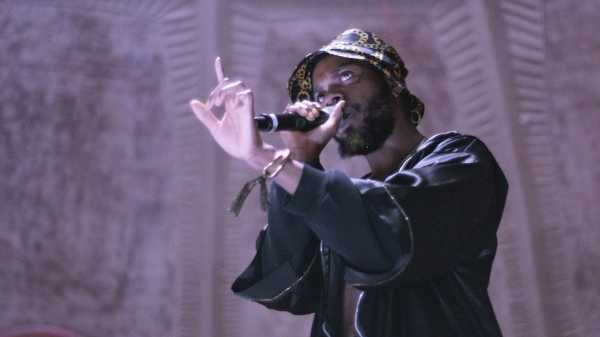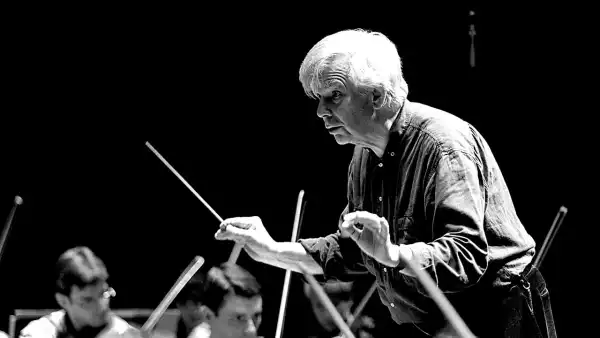
In May, Josiah Wise, known to most as the singer serpentwithfeet, walked on stage at Arcosanti, an experimental-living compound in the red-rock country just north of Phoenix. He was bare-chested, wearing a beard full of glitter, and carrying a blue pompom named Drama Pom. It was the first day of FORM—a three-day music festival that caps attendance at fifteen hundred people, a third of whom are musicians and their friends—and the mood in the audience was both giddy and reverential. “I’m ready to play and be gay,” Wise sang, ad-libbing during an interlude. “And I mean all definitions: be gay, and be merry, but also just be a fucking queen.”
Since 2016, when he released “blisters,” his first EP as serpentwithfeet, Wise has been carving out a particular kind of queendom in the R. & B. world. “Blisters” set the tone of his work: dark, spare arrangements; lush melodies with virtuosic runs; and lyrics that draw on the gospel tradition to tell stories of anguished queer love. Wise grew up in Baltimore, singing in the choir at a Pentecostal megachurch. At eighteen, he went to music school, in Philadelphia, where he aspired to become an opera singer. His tastes run wide: in conversation, he’ll cite Björk, Schumann, and Brandy in the same breath. A song like “four ethers”—which has him riffing over a Berlioz sample—came easily to him. As a teen-ager in the Maryland State Boychoir, he spent breaks with friends doing praise-and-worship versions of the classical works on the program. “R. & B. runs are always treated like they’re not sophisticated. But when you listen to Handel . . . It’s, like, ‘He Shall Purify’ is all runs!” he told me. “We would always do riffs on top of it.”
On “soil,” Wise’s first full-length record, he’s moved toward a more accessible sound. The songwriting is tighter; the arrangements clearer; and, unlike the EP, each song has a beat. The opening track, “whisper”—a collaboration with the sound artist and production savant Katie Gately—was completed first, and served as a blueprint: stacked vocals, lo-fi synths, and industrial drums. Gately made the song’s drum track using a recording of a washing machine, and there’s the same sort of halting, muffled quality to the rest of the album—beats caught in a rusted machine, heaving away.
“I’m very tacky, very raggedy,” Wise told The Fader. “I want people to feel that: ‘Oh, you can tell he did that himself.’ ” That roughness allows his voice—a gorgeous tenor that flutters in a distinctive, fast vibrato—to remain the focus. Runs come often: “I don’t like hard rises and falls,” he told me, explaining why he prefers his songs to build gradually. “You’re not waiting for one particular punch line, or one chorus; you’re tuned in from the first note.” He compared his vocal style to Toni Morrison’s “Beloved”: “If you stick around, you’ll understand why I build up this description for five pages.”
“Blisters” made no secret of Wise’s queerness, but in “soil” he gets more specific, his lyrics blurring the line between spiritual and sexual hunger: “I get to keep my mouth filled with you / I get to devote my life to him,” he sings on “cherubim.” An ambiguous “him” isn’t new to R. & B., or to pop music; many of Wise’s favorite divas—Brandy, Beyoncé—use devotional language to describe romantic love. Still, it’s been only six years since Frank Ocean came out, via Tumblr, as bisexual. And, although a handful of queer black male artists, such as ILoveMakonnen, Le1f, and Mykki Blanco, have since come out or come up, it still feels fresh to hear Wise sing about his sex life.“That’s what I’m proudest of—that I was able to talk about desire in a way I never knew how to before,” he told me. “The way a black man smells, the weight of his body odor, how that transports me.” One track, “waft,” describes him lusting after strangers based on smell alone, and issues a plea for men to discard their cheap cologne. “Maybe Tinder should have scratch and sniff,” he joked, after playing the song at FORM. “Like, how do you smell after the gym, after a leg day, when your calves are nice? How do you smell after your little farm-to-table meal?”
After sex comes the inevitable fall: anxiety, loneliness, loss. Like “blisters,” “soil” swells with grief. For another singer, this might be grist for songs of revenge and rage. But there’s a clear theme, on the album, of Wise embracing pain on its own terms—of suffering expanding his sense of self. On “mourning song,” Wise sings, “I don’t want to be small, small sad / I want to be big, big sad / I want to make a pageant of my grief.” Onstage at FORM, he talked about how the twin forces of rejection and acceptance had shaped him. “I told you I’m melodramatic,” he warned the audience.
The pleasure that Wise takes in performing—in acting out that pageant of grief—is infectious. “I love recording, but I love the stage the most,” he told me. “You should be coming to the live show. The record is just your appetizer. Stay for the lamb.” He wants to be a stage queen, he said, and listed off an eclectic group of performers—Bobby McFerrin, Grace Jones, Geoffrey Holder, Bilal, Eartha Kitt—as inspiration. What unites them is command—of the stage, of their voices, of their aesthetics. “You don’t care what they sing, you don’t care what they’re wearing, because you know whatever they do it’s going to be rapturous,” he said. “They just give me drama.”
At FORM, the stage was an open-air band shell that had been designed, in the seventies, to look like the apse of an Italian church, with a few psychedelic flourishes. Just behind the audience, a cliff, framed by a grove of cypresses, dropped a hundred feet into a valley. Wise’s voice soared for miles. During the final song, “bless ur heart,” he asked the birds, the animals, the trees, and the breeze to sing along with him. Fans and friends sat side by side, riveted. “Thank you for showing me that I can be grown, and I don’t have to be jaded,” he sang, the “you” left ambiguous. Just then, a wind swept in from the canyon, kicking up a thick dust that clouded the lights onstage. Wise paused, sighing. “Drama!” he laughed, eyes towards the sky. “Yes!”
Sourse: newyorker.com






